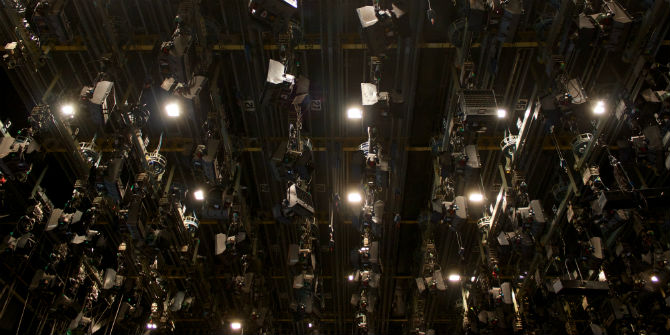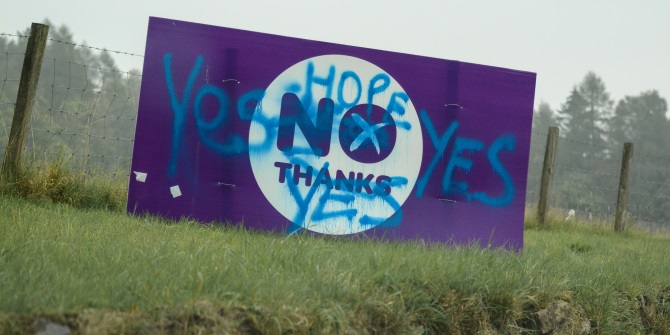 In this general election, Britain faces a paradigm shift, argues Abby Innes: the essential choice is between a government of the economic hard right that will complete the already-failed supply-side revolution of the last forty years, and a government willing to implement a Green New Deal that in turn will end the era of Neoliberalism. She writes that we should be under no illusion as to which road offers a future worth having and which a dystopia.
In this general election, Britain faces a paradigm shift, argues Abby Innes: the essential choice is between a government of the economic hard right that will complete the already-failed supply-side revolution of the last forty years, and a government willing to implement a Green New Deal that in turn will end the era of Neoliberalism. She writes that we should be under no illusion as to which road offers a future worth having and which a dystopia.
Given the dismal empirical record of forty years of pro-market reforms, the only way this Conservative Government can create the low tax, low regulation, law and order state of Neoliberal fever dreams is under the cover of other projects. Brexit offers a unique opportunity: it allows a government of economic extremists to manipulate our cultural identity to endorse a rewriting of the entire institutional rule-book. The recent assertion by Michael Gove that Brexit offers no lesser a liberating moment than the fall of the Berlin Wall is exactly wrong. Electoral success for the Conservatives will complete the capture of state authority by private business actors and consolidate the Conservative Party as a self-serving broker, first and foremost, between the residual powers of the state and the now largely unrestrained economic power of large private business and increasingly extractive financial interests.
As we see in Russia, Hungary, Turkey and the US, such developments require the authoritarian redirection and suppression of social anger. Lest we be in any doubt, these techniques are already with us in the pre-election campaigning of the Conservative Party and its open deployment of the Bannonite playbook: a representative parliament is prorogued; only those journalists who act as transmission belts for the government message are granted access; opposition parties and the most senior judges in the country are ruled illegitimate players; the electorate in one of the most unequal societies in Europe is referred to as a single, undifferentiated whole, and flattered with the imagery of a ‘caged lion’.
The Conservatives have placed a landmine under the British constitution that they will detonate if gifted with a majority. It is there in the manifesto, where it says that ‘After Brexit we also need to take a look at the broader aspects of our constitution: the relationship between the government, parliament and the courts, the functioning of the Royal Prerogative…’. It is there in black and white that they intend to change the rules of the democratic game and by saying it here they can later claim this as an open mandate. The result will be the institutionalisation of a monologue of executive power. And while this should alarm us, it should certainly not surprise us, because this is a Cabinet that subscribes, as no other Conservative British Cabinet before it, to the doctrine of full blown economic libertarianism.
Contrary to what the name implies, economic libertarians are not democrats. Their most important thinkers, from James Buchanan to Friedrich Hayek, concluded that economic liberty must supersede all other forms. Democracy as we have historically understood it is rejected by libertarians as a sham: as a block on the freedom of the private individual and the private corporation to roam unhindered in the global commodity space. As the Chicago economist and Nobel Laureate George Stigler put it quite openly:
The alternative [to radically shrinking the state] is to abandon total acceptance of present day democratic institutions. I must hasten to say that this is not to argue for totalitarianism in any form. Indeed, some alternative political systems that would insure a substantial reduction in the government role could be even more democratic in the sense that public policies could be closer to the desires of individual citizens.
Not totalitarian then, so long as you are happy to accept unquestioning belief in the primacy of corporate rights over your legal, political, and social rights for the rest of your life, without the opportunity to change your mind.
So this is an important election, in case you were in any doubt. It is ideological ‘twist or bust’.
What is invaluable in liberal democracy by contrast is its institutionalised understanding that society is both imperfect and imperfect-able. It is in liberal democracy alone that we are allowed to learn from our inevitable mistakes. Today’s Conservative government in the meantime is demonstrably willing to up-end the hard-won institutional structures of liberal democracy for the sake of a future that can only ever exist in the reactionary economic utopias of the Chicago and Virginia schools and in the preferences of the obscenely rich.
UK governments since 1979 have induced an extraordinary set of political economic outcomes under their bipartisan acceptance of neoclassical economics as ‘science’. As a predominantly mathematics-driven, hypothetical-deductive body of work, its empirical basis was always astonishingly weak, and weakest of all in the ‘first-best-world’ variation beloved of the libertarians. It has followed then that no imaginable conspirator, of the libertarian right who wanted to dismantle the state and see all but its powers of law and order rescinded, or of the revolutionary Marxist left could ever have masterminded such an elaborate and comprehensive cock-up as that which becomes apparent in the UK political economy today.
This is not to say that enthusiastic conspirators didn’t exist: they did and still do. But for all their efforts you and I still have a choice, and a free one for now. But this is the point: if the history of communism teaches us anything, it is that you can force entire societies to bow under fully totalitarian control and ideas that cannot possibly work still won’t. We can explore this grotesque experiment to its bitter end, but it is no more likely to redeem itself than Soviet Communism was in 1989. Libertarianism is based on a neoclassical conception of the economy as an isolated system that operates independently of all others systems, including the biosphere. In the light of the climate emergency, any ‘ultimate’ victory for this diehard group of free market fantasists will prove the most Pyrrhic in all time.
It is the peculiar curse of supply-side doctrine, as it was with Leninism, that even in the face of ever more dire social consequences, the circularity of its doctrine – the understanding of the economy as a closed system machine driven by dependable laws of economic motion – invites the doubling down on the revolution in rhetorical and practical terms. The circularity of the belief system creates the reasoning that, if not now, it must be at the point of completion that the total validity of the programme will be shown. As a result, the energy of these doctrines only becomes fully unspooled once the disorder they create has spread to every corner of the polity: when the entropy is total. The more completely the doctrine is followed in practice, the greater the distortions and social dysfunction of the real institutions of capitalism will become. With this comes the growing detachment of public political language from social reality, another process on which we are already clearly embarked.
Where all the post-war political economic doctrines were built on the acceptance of radical uncertainty and inescapable human flaws in both states and markets, Neoliberalism, no less than Leninism promised to relieve us of our ethical duty as citizens to think about what might be prudent, practical, and socially just, as distinct from automatically ‘true’ or allegedly inescapable within the terms of [non-existent] ‘natural’ economic or historical laws.
Where the reality of Soviet Communism was one of continuous repression, the social division caused by an unmediated capitalism requires brutal authoritarianism like that of Augusto Pinochet in Chile, and the greater the drive to complete this revolution the greater the repression and misdirection must be. We are currently living under a government that in truth has nothing left to offer beyond a purely instrumental, populist approach to sustaining the orthodoxy of unrestrained corporate rights. However, the more pure the doctrine of free markets that any government attempts to institute the more the pathologies of markets will be left to play out unmediated: towards monopoly, human and ecological exploitation, and financial extraction instead of innovation or enterprise in any socially coherent, productive or sustainable sense.
The supply-side revolution has turned out to be a process of setting fires under the hard-won institutions of democracy but with economic gains that accrue only to an ever-shrinking group of winners. The most potent justification for radical reform in the 1980s was that the state by the late 1970s was in the throes of a ‘crisis of ungovernability’, but the supply-side revolution has induced a political-economic crisis far more complete than the original. Not only have the long decades of bi-partisan consensus over economic liberalisation aggravated the emerging social divisions of deindustrialisation, they have literally dis-integrated the historically high-functioning and economically comparatively disinterested state that went before. As a matter of urgency then we need a government that is willing to rebuild the capacity of the local and central state and the wider ecosystem of civic institutions in such a way that these can enable the heavy lifting of transition to a zero-carbon economy. At this point in the climate emergency it is only the state that can mobilise the full institutional and policy toolkit to enable public, civic, business, financial and private effort that is now so essential. The democratic state is the historical source of systemic treatments for the evolutionary crises of capitalism. Now would be quite a good time to remember that.
If instead we choose to become caught up within this utopian/religious mindset, the words of our opponents are necessarily no longer accepted as motivated by anything as reasonable as empirical facts, or experience, or analytical expertise in any given arena. Complaints are necessarily disregarded as a false consciousness. It has been a standard Neoliberal catch-all for forty years to insist, for example, that any form of public servant who defends public institutions has mistaken their self-interest for their principles, so that nothing but the preferred market values and the hopelessly inadequate governmental toolkit of quantification can survive.
This temptation to dismiss your critics without reflecting on their arguments is a risk in any ideological position. But it is an unusually powerful tendency in any ideology that claims to be ‘scientific’, as Neoliberalism claims to be, and most assuredly is not in any serious, i.e. empirical sense. But this is the problem with materialist utopias of left or right. Sooner rather than later, any political language that builds itself on a doctrine of human perfectability is doomed to create a culture of lies: in Boris Johnson we have its most apt exponent. But be in no doubt that such a culture can be institutionalised in turn. Indeed, what other option do political forces of the economic hard right now have for their project to survive?
So at what point is enacting this doctrine in good faith or bad, by whatever means, no longer acceptable? How much more divided, angry, and unwell are we prepared to allow our society to become? How much more asset stripped our economy? At what point do we acknowledge that this, the sixth historical mass extinction event and the first caused by man, has already started to include us? How much damage should a body of ideas originally cut and paste from Newtonian mechanics and built on metaphors impossible to re-attach to the actual economy be allowed to inflict before it is rejected as empirically unfounded and morally indefensible? Neoliberalism breaches every real natural limit of our resilience: psychologically and ecologically, but just as the citizens under communism turned out not to be the compliant, distracted, exhausted masses of the Communist Party’s cynical hopes, neither should we be.
A paradigm shift is coming, but which future are we going to choose? Will it be the urgently required transition to a zero carbon economy that is compelled by the scientific method as properly understood, internationally agreed, and confirmed every day by ever more terrifying proof of nature’s ultimate sovereignty? Will we really gift control of the entire constitutional framework that took our forebears centuries to build, to this Cabinet of people as deaf to factual evidence as they are to self-doubt, so that it may be dismantled within a matter of months in further pursuit of a fantasy whose destructive, divisive reality we already live with daily? Will we really hand such an extraordinary degree of power to this self-appointed vanguard of the preposterously wealthy, who at best must believe that they alone have solved the riddle of history and found the one true path to a perfect social order in which all true-born Englishmen may prosper: where nature itself will be made to conform to their genius?
The father of sociology Max Weber warned that “The charismatic leader gains and maintains authority solely by proving his strength in life. If he wants to be a prophet he must perform miracles… Above all, however, his divine mission must ‘prove’ itself in that those who faithfully surrender to him must fare well. If they do not fare well, he is obviously not the master sent by the gods.” The problem for us of course is that by the time that reality confirms that no miracles are in fact about to follow the election of Boris Johnson it will be too late to change our minds. The constitution will have been changed and the state more completely captured by those powerful few who have a great deal of wealth and interest to lose by the final rejection of this most profitable and unholy of theologies.
________________
 Abby Innes is an Assistant Professor of Political Economy at the LSE.
Abby Innes is an Assistant Professor of Political Economy at the LSE.
All articles posted on this blog give the views of the author(s), and not the position of LSE British Politics and Policy, nor of the London School of Economics and Political Science. Featured image credit: Pixabay/Public Domain.








Great article. Interesting/Worrying how neatly the government’s behaviour during the pandemic maps onto the Neoliberal antics described herein.
Many commentators have identified how critical this upcoming election will be, but have generally cast it as an ideological choice between Conservative and Labour
Many voters imagine that Conservative plans are based on an historical ideology of, well, not much really, past the ‘keep things as they are’, some vague notions of ‘market based capitalism’, and a non-defined concept of ‘one nation’ conservatism. Compared this with Labour plans, which are characterised in the largely right-wing press as ‘socialist’, still seen unfortunately, through the prism of the Soviet system
Dr Innes demonstrates with startling clarity how much more important it is a stark choice between neoliberalism and liberal democracy
But many voters will not fully understand the dramatic and malign ideas of ‘neoliberalism’ and the unfortunately like-sounding ‘liberal democracy’. How many people can really define ‘free-market capitalism’ or, on the other hand, ‘socialism’. Always recall that everyone is a socialist when it comes to health provision, yet everybody is a free-market capitalist when it comes to (their own) house price
‘Getting rid of red tape’, usually used as a metaphor for ‘light regulation’ initially sounds appealing but can the average voter imagine ‘light regulation’ applied to justice (imagine unqualified judges); product safety (imagine cookers exploding) or food standards (imagine pandemics) drug approval (ditto) airline safety or unregulated financial services. Free-market/low regulation advocates should be challenged as to which aspects of organised society might be left to ‘the market’. There wouldn’t be much!
The most intriguing part of Dr Innes polemic comes very early on, where she explains that the only way that a putative Conservative government can create a ‘low tax low regulation law and order state of neoliberal fever dreams’ is under the cover of other projects, and identifies this Brexit project as the main culprit. One might even extrapolate as far as saying that their Brexit has actually got nothing to do with Europe
What these neoliberal/free-market/capitalist missionaries should have hurled at them is Mariana Mazzucato’s book ‘The Entrepreneurial State: Debunking Public vs. Private Sector Myths, tempered with a bit of Rawlsian philosophy: what would happen to their ideology if they were reduced to the same level as everyone else, and then asked what ideology they might then advocate?
Finally, they should be obliged to read and reflect on Pankaj Mishra’s chilling essay ‘The Malign Incompetence of the British Ruling Class’. Admittedly about Partition in India , but dismissive of the liers, cheats, mountebanks and the self-regarding morally degenerate charlatans who purport to be our leaders
Discretion averts me from identifying of whom I speak
Are you a politician?
Do you find democracy is thwarting your ambitions?
Then why not try FIRST PAST THE POST (FPTP) ?
In a major national survey eight years ago, two out three people couldn’t tell the difference between FPTP and Democracy.
FPTP: I can’t believe it’s not Democracy.
Thanks Abby for an accurate summary of the fate waiting for us at the hands of UK democracy. We have allowed the inherent greed and short term instincts of human beings to blank out the fundamental needs of the requirements for life on earth to continue.
I would like to be optimistic and think that our democratic processes can rectify the overwhelming influence of the right wing propaganda network as a rational response to the distortion caused by the untruths currently broadcast as facts, but I can not bring myself to be assured.
The best prospect I can visualise is that we are visited by a violent climate catastrophe that causes sufficient damage to make absolutely clear that our current way of life is thoroughly discredited and we establish an international war footing to tackle the Climate Crisis and that the reorganisation needed for the war regime establishes the Green New Deal Program.
A very well put and erudite article,Abbey,congratulations.
The political situation there in the UK have some uncanny parallels with the federal politics here in Australia.
The major difference is that we don’t have a contrivance like Brexit.
We have the reality of nationwide bushfires which hopefully will persuade the substantial climate change denialism lobby to capitulate.
A Green New Deal may become the worldwide rallying theme for progressive future action.
First of all, this article condemns the Lib Dems and the Labour Party as much as the Tories. Then, a win for the Tories does not mean Brexit, only a very slightly watered down version of May’s surrender document. More to the point, every accusation made against the Tories is as valid against the EU, but with one important difference: A Tory government can be voted out. The EU cannot be voted out. The author here speaks of democracy as she is in support of it, but to vote anything other than UKIP in the coming election is to vote for vassalage in one form or another. Vassalage was rejected by the majority in the Brexit referendum. Every party other than UKIP, and, until recently, The Brexit Party, has done their best to sabotage the clear choice the majority chose then. Farage looks to be manoeuvring The Brexit Party to the advantage of the Tories, thus Brino. The rise and rise of the resistance against the totalitarian EU federalisation project brought matters to a head by means of UKIP and its threat to the Tory Party, mistakenly still described as Conservative. The referendum was mooted, called, and debated at length. The EU apparatchiks showed a contemptuous attitude towards the very basic right of the UK as a nation to make such a “ once in a lifetime” decision. The Cameron government took sides, supporting Remain and using taxpayers’ funds and pressure on public servants to campaign against Leave. Nevertheless, Leave won. The wording of the referendum was unambiguous. It was in fact crystal clear what people were voting for. The entire political establishment finished the job of trashing the British ( English) Constitution which this traitor Bliar started, aided and abetted by Labour and twice affirmed by Labour voters. First past the post is in no small way responsible for the coming imbroglio. Well, the people chose to keep it. Vassalage, however, is not for the English. It never was. So don’t go thinking the Left will help shoehorn England into a federated EU. Labour has lost all credibility. It will get the votes from people who cannot bring themselves to vote for any other party or spoil/void/waste their vote. The show will go on. No matter if a federated EU will become established. If it does, it only means the ensuing civil war will be more bloody and protracted than it might be.